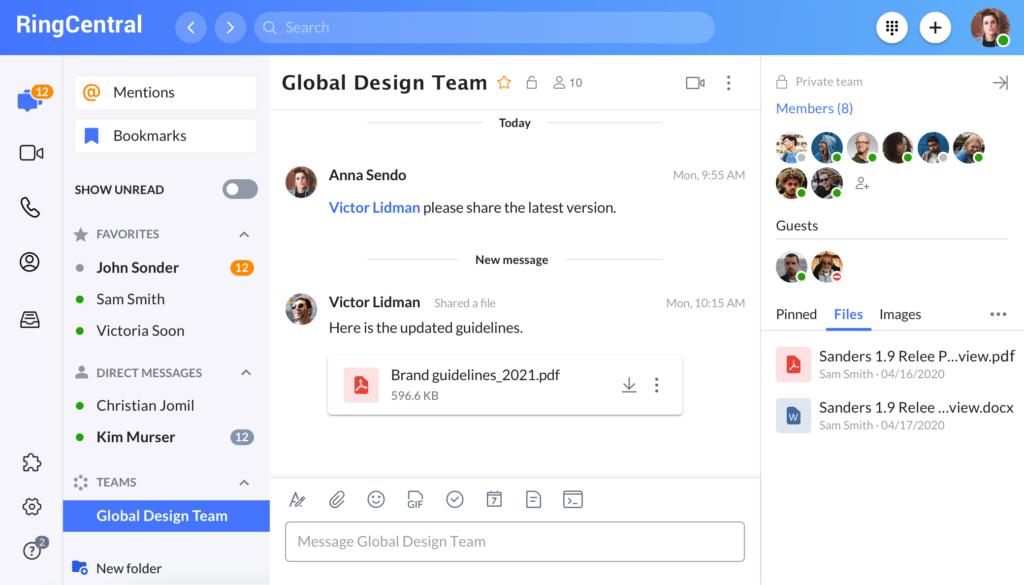Effective business communication is necessary for any business, but especially for small businesses when time is money.
It would be easy to assume that if enough team members are good communicators, your business communication will be great, too. However, this isn’t always the case.
When left without the right resources and support, effective business communication processes can be tricky to maintain. And, if communication within the company isn’t good, this can have a direct impact on the success of your business.
So, why is effective business communication so fundamental for businesses?
Here’s what we’ll cover today:
- What is “business communication”?
- Business communication methods
- 8 reasons small businesses need effective business communication
🛒 Shopping for communication tools? Don’t overlook these must-have features.
What is business communication?
When we think of business communication, we tend to focus on the internal, workplace communication. This describes the way in which people within the business communicate, namely between managers, team leaders, supervisors, and colleagues.
Business communication also applies to the way the company communicates with other businesses, shareholders, customers, and any other party outside of the business. This is known as external communication.
Types of communication
Internal
- Upward communication: This is communication to a manager (or any superior) from any person who reports to them in the organizational hierarchy.
- Managerial communication: Also known as downward communication, this is communication from the manager to the employee, or from any person who communicates with someone below them in the organizational hierarchy.
- Lateral communication: This is communication across departments and between colleagues.
External
- Meetings and feedback: Think of this as corporate communication. This includes webinars, conferences, and all meetings where an external party is present. You are representing your company when you attend such events outside the organization.
- Surveys: Surveys can give you a great idea of how customers feel about your brand. They are often sent via email, giving the business the opportunity to collect valuable and usable data.
- PR (public relations): This is the communication you have with the press. Many companies hire a PR firm to deal with this or have an in-house PR representative.
Both forms of communication can benefit from tools to assist in getting your messaging across. Software solutions like those offered by RingCentral, for instance, can be useful for internal video reviews between a manager and employee.
They can also be invaluable for conducting meetings with business partners virtually. No matter how your business communicates, it’s always useful to keep it on a centralized platform that everyone in the organization can access.

Business communication methods
When business communication happens, it’s typically one of three methods. Each communication method can be useful in its own right, depending on the situation and the nature of the discussion.
Here are the three main communication channels:
Verbal communication
Verbal communication refers to real-life conversations, which can be in-person, over the phone, or via video. It’s how we express ourselves through our words and tone of voice.
Written communication such as emails, messages, and texts also falls under this category. Platforms like RingCentral are ideal for verbal communication. It features a team messaging element that allows members to chat and send documents.
You can also make cloud-based phone calls to colleagues and clients in just a few clicks. If you want to see each other face-to-face, you can do so with video calls for up to 200 participants.
Non-verbal communication
Verbal communication is by no means the only way to share information in or out of the workplace. Non-verbal interactions include every way you can communicate without actually saying anything, such as body language, facial expressions, listening, and eye contact.
Visual communication
This is how your business expresses itself through graphics, PowerPoint presentations, photographs, signs, posts, advertising, and so on. Typically, this is more used in external communication. The marketing team will be very familiar with this method of sharing messages.
However, it can also be used within the workplace. For instance, on the walls of the office there may be artwork reaffirming the business’s goals and targets. This business writing is there to encourage employees, as well as remind them of what they’re working towards.
8 reasons why you need effective business communication in your company
1. Improves employee engagement
Employee engagement is at the heart of every business. If your employees aren’t committed and engaged in the work they’re doing, can you really be sure your business is meeting its goals? Effective business communication can improve employee engagement. When employees don’t feel as if they are being led with clarity and guidance, it can have a negative impact.
This is proven by Harvard Business Review‘s look into employee engagement in relation to business communication. Their review found that 57% of employees report they are not being given clear directions. On top of this, it revealed that 69% of managers are not comfortable communicating with employees in general.
Businesses need to give effective training to employees to ensure that managers and business leaders are clearly communicating with one another. If not, messages can be lost in translation, causing preventable mistakes. Overall, when business communication is successfully present in a business, employee engagement can improve.
The below graph demonstrates just how important employee engagement is to a business, with 71% of people saying it was most likely to bring success. Above this, effective communications comes in at 73%. It shows us that being an effective communicator is a key skill for businesses.
2. Good for team building
Building strong relationships with coworkers is important. We spend a great deal of our lives working with colleagues. Therefore, communication needs to be kept high to ensure relationships are strong. Nowadays, many people choose to work more flexibly. That means remote work, part-time work, or flexi-time.
To keep teamwork high, businesses need to invest in software that can support collaboration. No matter where employees are in the world. 60% of people agree that using technology at work helps them to feel more connected and establish meaningful relationships.
By utilizing video conferencing software and team messaging platforms like those provided by RingCentral, employers are providing team members with the tools to stay in touch with colleagues throughout the day.

With RingCentral you can send video meeting invites straight through to your team’s email accounts with the handy Gmail integration. You can also annotate files in real time to ensure you’re all on the same page.
What’s more, to further explain ideas, you can share your screen. This can be useful when you’re going over the finer details of the project. And, once the meeting is finished, you can send meeting recaps such as recordings or the meeting minutes to the team. This helps the team to feel connected, even when they’re on the go.
By being actively involved in business activity and group discussions, employees can feel like they’re part of a team. It creates a sense of belonging. This strengthens the bonds between colleagues, which is great for team building.
3. Boosts customer relationships
Customer relations are vital for any business. Whether you’re catering to the general public or B2B. Business communication can help to boost customer relationships. Because customer’s love knowing that you’re honest and transparent with them wherever possible.
It’s also necessary to have good business communication processes in place when it comes to dealing with complaints and concerns. Most businesses invest in software to help them solve customer issues quickly and effectively. These problems can either be handled through live chats, social media inboxes, or over the phone.
Tools like RingCentral are great for customer service, even when working remotely. Using its cloud-based contact center platforms, agents are still able to take calls and assist customers when working out of the office. The team can take inbound calls, read prompts from a script, and look up the customer’s information on file.
Additionally, using custom-branded white-label communication apps like Acrobits can enhance business communication. These apps not only create a fully branded UCaaS collaboration environment, making communication smoother and more professional, but also feature the client’s brand on the software and can include the specific features each project needs.
If you receive most of your contact from customers through social networking platforms, you can also streamline this inbound traffic to one place so it’s easier to manage. This boosts productivity and allows you to provide great customer service no matter where you are.
When customers feel as though their needs have been fulfilled, they’re more likely to shop with you again and recommend you to a friend. This is ideal for your reputation and your bottom line.
4. Helps with business goals
Another reason why you need effective business communication skills present in your company is that it helps with business goals. When employees are consistently briefed on business goals, they have a better idea of what they need to do to work towards them.
71% of people who use an online project management system feel it’s easy to get an exact overview of where projects are up to in their workflow.
Communicating with employees also ensures that they’re working well together. Team leaders can:
- Check in with team members to stay on track with projects
- Update the team on any changes with tasks
- Ensure employees understand the work they are doing
- Help employees keep to deadlines
Imagine a team is consistently handing in projects before the deadline. The business’s goal may be: “To deliver five projects on time in the first quarter.” If this is the case, then the business goals are being met. This is made possible through the constant support of team leaders communicating with team members.
Software like RingCentral helps with this. It provides the team with a centralized platform to work from. Team leaders can message, video call, and voice call, all in one place. They can also track projects and assign tasks from their mobile device. This makes communication easier, as they can still keep in touch with the team without being tied to their desk.
All of this means that managers and team leaders have a good idea of how well projects are going. This deepens their knowledge in regard to KPIs and other business goals. This graph explains that helping employees understand how their work impacts the company can improve performance.
5. Creates a communicative culture
Companies that communicate in an open and transparent way have a more positive company culture. The work atmosphere is healthier, and as we’ve seen, employees are more engaged.
When you create a culture of effective communication, all future employees will become aware of this during their onboarding. That way, you’re maintaining your company’s shared values every time a new person joins.
By showing employees you’re happy for them to work remotely, you’re also giving them a more flexible work schedule. Collaborative software like RingCentral is ideal when you’ve got a remote working team. You can meet over the phone or face-to-face through the video conferencing tool for important reviews and catch-ups. This can be beneficial for those struggling with the transition from office to online as it’s more personal than an email.
More than this, you can set up teams for collaboration on certain projects, share files, and send messages through RingCentral’s team messaging tool. For new employees, knowing that your business is already equipped for working from home can be a great plus. It can even give you the edge over competitors.
According to a survey by PWC, 71% of respondents say supporting remote and virtual working is important to their future. Create a communicative culture so great that employees feel secure and valued in their job role, even when working remotely.
6. Encourages collaboration
Perhaps one of the most obvious reasons as to why you need effective business communication in your company is to encourage collaboration. Provide employees with the right tools to be able to communicate effectively and efficiently with colleagues. Not everyone is a natural communicator. So tools and project planning platforms do help.
If you don’t provide them, employees risk missing out on important information and falling behind on group projects. This is particularly the case if they are working remotely and not always in the office.
Collaboration is key when you’re working on tasks with strict guidelines and deadlines. Each team member needs to be confident in their role and what they need to deliver. Using software such as RingCentral’s video conferencing tool helps with this. Colleagues can hop on a call to go over tasks, and even send documents and important files on the group chat.

7. Increases productivity
Does it surprise you that 74% of people often lose files that have been shared with others? That’s the reality for many businesses that lack good communication tools.
If you’re working on a project and trying to piece together files, but you’ve somehow lost them in transition, you’ll be spending time retrieving those files. Time that could have been spent on other projects, or moving forward with the one in hand.
Not only is it greatly inconvenient for the parties involved but it also slows down your workflow. Effective business communication can stop events like this from occurring. By using software like RingCentral to securely send files and organize conversations with colleagues, you won’t waste time scouring through emails trying to locate important documents.

8. Improves creativity
When people feel like their ideas are listened to, it can boost creativity within the workplace. People feel more empowered to make bold suggestions if they are given a safe space to do so. That’s why team messaging platforms and project organization tools are so important.
If you don’t listen to your team members or don’t give them a place to voice their opinions, you risk losing out on some great ideas. Effective business communication ensures this doesn’t happen. Whether you hold regular 1:1 meetings on video conferencing platforms or have a group chat dedicated to “new ideas,” you have the power to breed creativity.
Implementing effective business communication
Now you’ve got a better understanding of what effective business communication is and why you need it, it’s time to put a plan into action. Include it in your business processes and communication strategies. Whether you’re a startup or a well-established business, it’s never too late to begin implementing effective business communication.
Ask your employees how they feel about your internal and external business communication. Send out a questionnaire that leaves them room to provide their feedback, including what they think you could be doing better. And it’s likely they’ll have some constructive criticism, given that 8 out of 10 people rate their own business’s communication as either average or poor.
What’s more, consider how you can better equip employees to improve business communication. If you think your managers would benefit from business communication skills training, then now is the time to enroll them in a course. Similarly, if team members believe that a central all-in-one communications solution would help them collaborate, invest in software like RingCentral.
RingCentral features video conferencing, voice calling, and team messaging capabilities. Not only this, but you can also track and assign tasks, send files, and integrate your existing tools with it. This makes it an ideal companion for your team members.
It’s also handy for external communication because you can video call with clients in just a few taps. You don’t even need to be in the office. With the RingCentral app, you can work remotely and make calls from anywhere.
To summarize, here are some things you can do to implement effective business communication:
- Invest in communications software
- Integrate your existing software with your project planning tools
- Hold regular 1:1 meetings with team members
- Host monthly meetings to encourage employees to share their views
- Send regular surveys to customers for feedback
So, what steps will you be taking to ensure your business communication is the best it can be?
Originally published Apr 22, 2023, updated Jun 17, 2024





